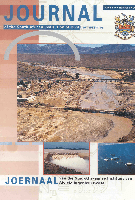
Journal of the South African Institution of Civil Engineering
Scope & Guideline
Connecting professionals to shape the future of engineering.
Introduction
Aims and Scopes
- Structural Engineering and Material Performance:
The journal publishes research on structural integrity, performance assessment, and innovative construction materials, emphasizing studies on concrete, steel, and composite materials under various loading conditions. - Transportation Engineering and Safety:
Research on transportation infrastructure, including road safety assessments, traffic management, and sustainable mobility solutions, is a significant focus area, aiming to improve the safety and efficiency of transportation systems. - Water Resources and Environmental Engineering:
The journal explores topics related to water quality modeling, flood risk assessment, and sustainable water management strategies, highlighting the importance of environmental considerations in engineering practices. - Geotechnical Engineering and Soil Mechanics:
Papers addressing soil behavior, geotechnical investigations, and the impact of geological conditions on construction practices are prevalent, reflecting the need for robust foundations and earthworks in civil engineering. - Climate Resilience and Sustainability:
The journal emphasizes research on the impacts of climate change on infrastructure, promoting sustainable design practices and resilience strategies to mitigate environmental risks in construction.
Trending and Emerging
- Resilience and Adaptation to Climate Change:
Research on infrastructure resilience to climate change impacts is on the rise, emphasizing the need for engineering solutions that can withstand extreme weather events and changing environmental conditions. - Advanced Computational Modelling Techniques:
There is an increasing trend in the use of advanced numerical modeling and simulation techniques to predict structural behavior and optimize design processes, reflecting a move towards data-driven engineering practices. - Sustainable and Innovative Construction Practices:
Emerging themes include the exploration of sustainable materials and construction methods, such as recycled materials and low-impact designs, as the industry seeks to reduce its environmental footprint. - Smart Infrastructure and Technology Integration:
The integration of technology in civil engineering, including the use of big data, BIM, and IoT, is gaining attention as researchers explore how these innovations can enhance infrastructure management and efficiency. - Comprehensive Risk Assessment Frameworks:
There is a growing emphasis on holistic risk assessment frameworks that consider a range of factors, including environmental, social, and economic impacts, in the planning and execution of civil engineering projects.
Declining or Waning
- Traditional Materials Research:
There has been a noticeable decline in research focused solely on conventional materials, such as basic concrete or standard asphalt mixes, as the field shifts towards more innovative and sustainable material solutions. - Generalized Safety Assessments:
Broad approaches to safety assessment without specific contextual applications are becoming less frequent. The trend is moving towards more detailed, context-specific safety evaluations that consider unique local conditions. - Conventional Water Management Techniques:
Research centered around traditional water management strategies is waning, as newer, more integrated approaches that consider climate change impacts and sustainability are gaining traction.
Similar Journals

Gradevinar
Advancing Civil Engineering Knowledge, Open to AllGradevinar, published by the Croatian Society of Civil Engineers-HSGI, is a leading Open Access journal in the field of Civil and Structural Engineering, with a significant history that dates back to its inception in 1980. This journal, with the ISSN 0350-2465 and E-ISSN 1333-9095, has established itself as a vital platform for disseminating innovative research and practical developments in civil engineering, particularly since it became Open Access in 2000, facilitating unrestricted access to its wealth of knowledge. As of 2023, Gradevinar is ranked in the third quartile (Q3) of Scopus’s Civil and Structural Engineering category, demonstrating its growing influence and relevance in the academic community, with a current ranking of #255 out of 379 journals in the field. Researchers, professionals, and students benefit from this journal's commitment to high-quality content that reflects the latest advancements and best practices in civil engineering, contributing to both technical proficiency and sustainable development in infrastructure projects across Croatia and beyond.

KSCE Journal of Civil Engineering
Exploring New Frontiers in Structural DesignKSCE Journal of Civil Engineering is a prestigious international publication dedicated to advancing the field of civil engineering. Established by the Korean Society of Civil Engineers (KSCE), this journal serves as a vital platform for high-quality research in the discipline, showcasing innovative methodologies, case studies, and critical analyses pertinent to civil and structural engineering. With an impact factor placing it in the Q2 category of civil engineering journals for 2023 and a solid Scopus rank of #141 out of 379, it reflects the significant contributions of its authors and the growing recognition of its published works. KSCE Journal of Civil Engineering, based in Germany and easily accessible to the global research community, is committed to disseminating knowledge with rigor and integrity, encouraging both emerging scholars and seasoned experts to contribute to the evolving discourse in civil engineering. With a convergence period from 2009 to 2024, the journal continues to uphold its mission of fostering innovation and excellence in engineering practice.
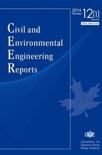
Civil and Environmental Engineering Reports
Connecting global minds for a sustainable engineering future.Civil and Environmental Engineering Reports is a prestigious open access journal published by UNIV ZIELONA GORA, dedicated to advancing research in the dynamic fields of civil and environmental engineering. With its ISSN 2080-5187 and E-ISSN 2450-8594, the journal aims to disseminate innovative studies, methodologies, and practical applications that address contemporary challenges in these disciplines. Since its establishment in 2014 as an open access platform, it has emerged as a vital resource for researchers, professionals, and students alike, enabling free access to high-quality research findings. Situated at Licealna 9, Zielona Góra 65-417, Poland, the journal strives to foster collaboration and knowledge exchange within the global engineering community, making it an essential reading for anyone invested in civil and environmental engineering advancements.

Bulletin of Earthquake Engineering
Empowering engineers with cutting-edge insights.The Bulletin of Earthquake Engineering is a premier journal published by Springer, dedicated to the field of earthquake engineering and its related disciplines. Established in 2003, this esteemed journal has evolved into a critical platform for disseminating cutting-edge research in Building and Construction, Civil and Structural Engineering, Geophysics, and Geotechnical Engineering and Engineering Geology, earning a distinguished position in the Q1 quartile across these categories. With an impressive ranking in Scopus, notably a rank of #8 in Earth and Planetary Sciences for Geophysics, the journal addresses urgent challenges in the mitigation of seismic risks and the enhancement of structural resilience. Researchers and practitioners benefit from a wealth of peer-reviewed articles, insights, and methodologies relevant to modern engineering practices aimed at improving safety and sustainability in earthquake-prone regions. The Bulletin of Earthquake Engineering embodies a commitment to advancing knowledge and practice in earthquake resilience, making it an invaluable resource for academics, industry professionals, and rising scholars alike.

Baltic Journal of Road and Bridge Engineering
Transforming Challenges into Engineering TriumphsThe Baltic Journal of Road and Bridge Engineering, published by RIGA TECHNICAL UNIV-RTU, serves as a pivotal platform for disseminating cutting-edge research in the fields of building and construction as well as civil and structural engineering. Established as an Open Access journal since 2006, it fosters global collaboration and accessibility to critical engineering knowledge, facilitating the exchange of innovative ideas among researchers, professionals, and students. With a commendable impact factor and recognition in Scopus rankings, where it stands in the third quartile for both relevant engineering categories, the journal underscores its significance in advancing the discipline. The journal aims to publish high-quality, peer-reviewed articles that address contemporary challenges in road and bridge engineering, making it an essential resource for anyone involved in infrastructure development and research. Located in Lithuania at 6B Kipsalas Street, RIGA LV-1658, this journal not only highlights the latest advancements but also seeks to inspire future innovations in engineering practices.
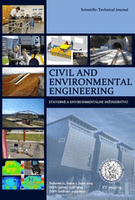
Civil and Environmental Engineering
Connecting theory with practice in civil and environmental engineering.Civil and Environmental Engineering, published by SCIENDO, is a prominent open-access journal dedicated to advancing research and knowledge in the fields of civil and structural engineering, as well as environmental engineering. Since its inception in Germany, it has been committed to promoting cutting-edge studies and methodologies that address the pressing challenges in these domains. With an ISSN of 1336-5835 and E-ISSN of 2199-6512, the journal is accessible to a global audience, having adopted an open-access policy since 2014 to enhance the visibility and dissemination of scholarly work. The journal currently holds a Q3 ranking in both Civil and Structural Engineering and Environmental Engineering, as of 2023, reflecting its growing influence within the academic community. It operates within a framework of rigorous peer-review standards and encourages contributions that not only contribute to theoretical advancements but also have practical implications for real-world applications. Researchers, professionals, and students alike will find invaluable insights and innovative perspectives in the latest studies published from 2018 to 2024.
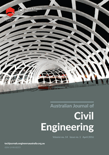
Australian Journal of Civil Engineering
Shaping the Landscape of Civil Engineering KnowledgeThe Australian Journal of Civil Engineering, published by Taylor & Francis Ltd, stands as a pivotal platform within the field of civil and structural engineering. With an ISSN of 1448-8353 and an E-ISSN of 2204-2245, this journal consistently delivers high-quality research and innovative practices from both established and emerging scholars in the discipline. Recognized in the Q2 category for Civil and Structural Engineering in 2023, it holds a respectable position, ranking 146 out of 379 within its field according to Scopus, which places it in the 61st percentile. Converging valuable insights from 2011 through 2024, the journal encompasses a broad scope of topics, including sustainable infrastructure, innovative materials, and advanced construction techniques, thereby addressing contemporary challenges faced by engineering professionals. Though it is a traditional publication without open access options, the quality of the research featured ensures that it remains an essential resource for academics, practitioners, and students striving to enhance their knowledge and contribute to the dynamic field of civil engineering.

Teknik Dergi
Bridging Theory and Practice in Civil EngineeringTeknik Dergi is a key academic journal published by the Turkish Chamber of Civil Engineers, focusing on the critical fields of Building and Construction as well as Civil and Structural Engineering. Established in Turkey, this journal serves as a vital platform for researchers, practitioners, and students to disseminate innovative findings and advancements within these disciplines. Although its coverage in databases like Scopus has been discontinued since 2022, Teknik Dergi remains a respected resource for its historical contributions, with a record of publication spanning from 1990 to 1998 and then from 2002 to 2022. The journal currently holds a Q4 categorization in both its primary fields, ranking within the 30th and 25th percentiles respectively. Authors and readers can access articles exploring practical applications and theoretical foundations, making it a valuable asset for those engaged in the rapidly evolving landscape of civil engineering. Open Access options are also available, allowing for broader dissemination and engagement with its published work.
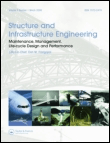
Structure and Infrastructure Engineering
Pioneering Research for Sustainable Engineering SolutionsStructure and Infrastructure Engineering, published by TAYLOR & FRANCIS LTD, is a premier academic journal that serves as a vital resource in the fields of engineering and construction. Featuring an ISSN of 1573-2479 and an E-ISSN of 1744-8980, this journal has established its reputation as a leader in disseminating high-quality research. Since its inception, it has successfully transitioned through converged years from 2007 to 2024, earning a prestigious position within the Q1 quartile across multiple engineering disciplines, including Building and Construction, Civil and Structural Engineering, and Ocean Engineering, among others. Its impact is underscored by impressive Scopus rankings, particularly its 5th rank in Ocean Engineering within the top 95th percentile. The journal’s commitment to advancing knowledge in safety, risk, reliability, and quality makes it an indispensable platform for researchers, professionals, and students aiming to stay at the forefront of engineering innovations. Access to its comprehensive articles allows for a deeper understanding of contemporary challenges and solutions in infrastructure development.
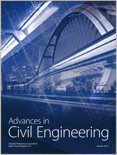
Advances in Civil Engineering
Advancing the Science of Sustainable DesignAdvances in Civil Engineering is a leading peer-reviewed journal published by HINDAWI LTD, dedicated to advancing knowledge and innovation in the field of civil and structural engineering. Holding an esteemed Q2 ranking in the 2023 category for Civil and Structural Engineering, this journal serves as a vital platform for disseminating cutting-edge research and practical applications that address contemporary challenges in infrastructure development, sustainable design, and material science. Launched in 2008 and operating as an Open Access journal since 2009, it promotes the free exchange of ideas by ensuring that all articles are accessible to researchers, professionals, and students globally. The journal is also indexed in Scopus, ranking at #142 out of 379 in its category, situating it within the 62nd percentile of its peers. With a focus on interdisciplinary collaboration and innovative solutions, Advances in Civil Engineering contributes significantly to the ongoing evolution of engineering practices and education, making it an essential resource for anyone involved in or studying the ever-evolving field of civil engineering.